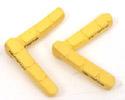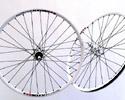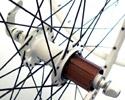Swiss Stop Yellow King brake pads - do these come in bulk?
They don't look like much
Photo ©: James Huang

|
Road brake pads generally aren't given much thought, but the ability
to stop or scrub off speed effectively is arguably one of the most
critical features regarding a bike's overall performance (or, at
the very least, safety). The growing popularity of carbon-rimmed
wheelsets has only served to highlight that fact, as stock brake
pads are often woefully inadequate for the job; in the worst cases,
they can be downright dangerous, and unfortunately, even many 'carbon-specific'
pads leave much room for improvement.
Swiss Stop bills its Yellow King compound as the ultimate carbon-specific
rim, and apparently its brake pad chemists have cut some sort of
deal with creatures from the underworld as we'll be damned if we
have any evidence to refute that claim. Braking on each of our carbon
testers (we sampled four from four different manufacturers) was
simply eye-opening as it was the first time we'd experienced braking
quality that good on the stuff, wet or dry.
Well, maybe that's not entirely true… now that we think about it,
we had a similar experience while
sampling Mavic's new Cosmic Carbone Ultimate wheelset matched
with its carbon-specific pads. At the time, we said the braking
characteristics were "predictable, quiet, and most importantly,
quite powerful." As it turns out, though, those carbon-specific
pads are actually made for Mavic by Swiss Stop and are nearly identical
to the Yellow King compound so apparently we shouldn't be surprised.
What did come as a surprise, however, was the Yellow King's braking
quality on standard aluminum rims. While not the best we'd experienced,
they were certainly still quite good and would more than suffice
for racers who train on aluminum but race on carbon (kiss those
last-minute brake pads swaps goodbye).
Cyclocross racers in particular will be thrilled to know that Swiss
Stop also offers the Yellow King compound in both a straight post
and cartridge insert for threaded carriers for use with cantilevers
(kiss those uncontrollable slides into the barriers goodbye). As
icing on the cake (mmm… cake), just about anyone will appreciate
the fact that our test pads have worn surprisingly well, too.
It's rather rare that we'll gush so lovingly on a product, but
the accolades are well deserved in this case. Dare we say that it's
unlikely that you'll find us using another brake pad on a carbon-equipped
tester anytime soon as long as we have some say in the matter.
Price: US$41.60 (Flash Yellow King for Shimano/SRAM, set
of four); US$62.40 (Race2000 Yellow King for Campagnolo, set of
four)
Pros: Superb braking performance on carbon rims in all conditions
coupled with excellent performance on standard aluminum, very good
wear characteristics
Cons: expensive, but well worth the price
Cyclingnews rating: 

Syncros FL23 wheelset - dressed in white and ready to get dirty
The Syncros FL wheelset
Photo ©: James Huang

|
We're not exactly sure when white mountain bike components became
all the rage, but Syncros seems to have bought heavily into the
trend as an inordinate percentage of its line is available in the
controversial finish as an option. Included in that grouping is
our FL test wheelset, with matte white rims, hubs and skewers (standard
production versions use black hubs and skewers).
At 1702 per pair (788g front/914g rear), the Syncros FL wheelset
doesn't quite qualify as pure XC-race gear, but to be fair, Syncros
doesn't necessarily intend it as such. Syncros bills the FL as more
of a 'hardcore XC/marathon' wheelset and equips it with its 23mm-wide
FLR DS23 disc-specific rim, DT Swiss Super Comp 14/16/15g spokes
and alloy nipples, and FL-series six-bolt disc-compatible cartridge
bearing hubs. The rear hub's six-pawl driver mechanism is virtually
identical to other Taiwanese-made units we've tested recently (with
good success, we should add), but Syncros says its FL hubs are unique
by virtue of their double-row angular contact bearings which are
better equipped to handle lateral loads.
The white hubs on our tester
was a one-off build
Photo ©: James Huang

|
Our FL set was reasonably true and evenly tensioned, particularly
considering their arduous history (our test sample had supposedly
traveled the '06 trade show circuit). Installation was a standard
procedure, but we were immediately disappointed to find that the
FLR DS23 rims were not UST tubeless-compatible. Nonetheless, we
dug up some appropriate tube-type Michelin 2.3" rubber and inner
tubes (now where had I put those again?) and set along our merry
way.
If we had to choose a single word to describe the ride of the FL,
it'd be 'solid'. For a middleweight wheelset, they spin up reasonably
quickly on the trail but are also admirably rigid and responsive.
Hub bearings remained buttery smooth throughout, and only the slightest
bit of truing was required during several months of testing. We'll
admit that we had our initial reservations about the durability
of the white rim finish, but the paint has held up surprisingly
well even in our rocky test environment.
Overall, the FL wasn't the lightest and fastest, nor the beefiest
or stiffest, but it did manage to strike a very good balance overall
and would certainly satisfy the 'one wheel' requirement as long
as you're ok with running tubes.
Weight: 1702g/pair (788g front/914g rear, without skewers),
116g (skewers, pair)
Price: US$299.95 (FL front); US$379.95 (FL rear)
Pros: Excellent build quality, stiff and responsive for a
middleweight wheelset, polarizing white finish
Cons: Not UST compatible, polarizing white finish
Cyclingnews rating: 
PhotographyFor a thumbnail gallery of these images, click here
Images by
James Huang/Cyclingnews.com
|





